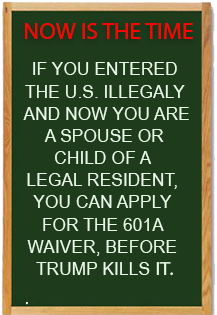
I-601 Waiver Can be Used for Many Purposes
All About the I-601 Waivers

"We have had a significant number of I-601 waivers approved. If you are unsure how to proceed, give us a call and Immigration Attorney Moses Apsan will provide you with a consultation exploring every available avenue to resolve your immigration problem."
Form I-601, (Application for Waiver of Ground of Inadmissibility) can be used for immigrant visas, non-immigrant fiancé visas, V visas, and adjustment of status , to request a waiver of the following grounds of inadmissibility in the Immigration and Naturalization Act (INA):
- Section 212(a)(1) – health-related grounds;
- Section 212(a)(2) – criminal and related grounds,
- Section 212(a)(3)(D) - immigrant membership in a totalitarian party;
- Section 212(a)(6)(C) – misrepresentation in immigration matters;
- Section 212(a)(6)(E) - smugglers;
- Section 212(a)(6)(F) - subject to civil penalty;
- Section 212(a)(9)(B) – unlawful presence in the U.S. for at least 180 days, beginning on or after April 1, 1997, followed by departure from the U.S.
Note that this is the waiver used for those that lived illegally in the U.S. for more than six months followed by an trip out of the U.S.
Form I-601 is also used to waive certain grounds of inadmissibility when an applicant is seeking immigration benefits under the Nicaraguan Adjustment and Central American Relief Act (NACARA), the Haitian Refugee Immigrant Fairness Act of 1998 (HRIFA), and under the Temporary Protected Status (TPS) or Violence Against Women Act (VAWA) program. Because officers at international USCIS offices are not likely to encounter these types of waiver applications, this SOP will only briefly address them.
Grounds of Inadmissibility and Waiver Provisions
The statutory and regulatory authority of USCIS to grant waivers is outlined in the chart below.
|
Type of Inadmissibility |
Inadmissibility Ground |
Waiver Authority |
Regulation / Notes |
|
Health-related |
212(a)(1) |
212(g) |
8 CFR 212.7(b) |
|
Criminal-related |
212(a)(2) |
212(h) |
212.7(d) |
|
Immigrant membership in a totalitarian party |
212(a)(3)(D) |
212(a)(3)(D)(iv) (for close family members) |
|
|
Misrepresentation |
212(a)(6)(C) |
212(i) |
|
|
Smugglers |
212(a)(6)(E) |
212(d)(11) |
|
|
Subject of civil penalty |
212(a)(6)(F) |
212(d)(12) |
|
|
Unlawful presence |
212(a)(9)(B) |
212(a)(9)(B)(v) |
|
|
Previous immigration violation by approved VAWA self Petitioner |
212(a)(9)(C) |
212(a)(9)(C)(iii) |
NOTE: Reinstatement under 241(A)(5) does not apply to these applicants. |
|
Prior Removal and previous immigration violations by NACARA 202 or HRIFA beneficiaries |
212(a)(9)(A) and (C) |
LIFE ACT amendments, PL 106-554, section 1505 |
8 CFR 245.13(c) and 8 CFR 245.15(e). NOTE: Reinstatement under 241(a)(5) does not apply to these applicants |
|
Almost Any Ground of Inadmissibility for Applicants for TPS |
212(a) inadmissibility grounds that apply may be waived, except for the following: • 212(a)(2)(A); • 212(a)(2)(B); • 212(a)(2)(C) relating to drug offenses, except for a single offense of simply possession of 30 grams or less of marijuana; • 212(a)(3)(A); • 212(a)(3)(B); • 212(a)(3)(C); or • 212(a)(3)(E). |
244(c)(2) |
8 CFR 244.3 |
It is important to note that there are no waivers available for certain scenarios that are commonly encountered in the overseas context. For example, an applicant applying for a waiver based on having accrued unlawful presence in the U.S. may also be inadmissible for having failed to attend an immigration court hearing. Therefore, officers must carefully review the record to identify all grounds of inadmissibility. Various scenarios that may be common in the overseas context and for which no waivers are available are identified.
I. Validity of an Approved Waiver
A. Valid Only for the Crimes, Events, or Incidents Specified in the Waiver Applications
An approved waiver is only valid for those crimes, events, or incidents specified in the application for a waiver. Except as specified in Sections III(B), (C) or (D) of these procedures, or for individuals granted Temporary Protected Status (TPS), once granted, the waiver is valid indefinitely, even if the recipient of the waiver later abandons or otherwise loses lawful permanent resident status. If an individual had been in the United States on TPS status and the status was granted after a waiver of inadmissibility was approved, the applicant is required to obtain a new waiver when applying for other benefits, if still inadmissible. The waiver granted for TPS purposes is valid only for TPS purposes.
B . Conditional Grant of a Waiver to K-1 and K-2 Visa Applicants
Although the K classification is a nonimmigrant classification and is generally eligible for an INA 212(d)(3)(A) nonimmigrant waiver, DHS regulations permit the K visa applicant to file a Form I-601 to obtain an immigrant waiver of admissibility. 8 CFR 212.7(a). USCIS has jurisdiction of section 212(d)(3)(A) requests in the case of K nonimmigrants. A separate 212(d)(3)(A) application and fee is not required when a section 212(d)(3)(A) request originates with a Department of State officer. 8 CFR 212.4(a)(1). Generally, a consular officer may forward to USCIS both a Form I-601 packet (for the immigrant waiver) and a Form OF-221, Two-Way Visa Action and Response, recommending a grant of a nonimmigrant waiver. (9 FAM 41.81 N9.3). If the consular officer submits an OF-221 along with the Form I-601 and USCIS staff approve the Form I-601, USCIS staff should also approve the OF-221. If the Form I-601 is denied, staff should also deny the OF-221. Because a K-1 (and K-2) applicant does not yet have the requisite relationship to a United States citizen, to qualify for an immigrant waiver, the approval of the Form I-601 is granted on a conditional basis. That is, USCIS makes a final determination on the eligibility for an immigrant waiver from inadmissibility once the applicant (or the applicant's spouse) has celebrated a bona fide marriage to the U.S. citizen who had filed the K visa petition. If the applicant establishes eligibility for the waiver when seeking a K-1 or K-2 visa, the adjudicator conditionally approves the application. The condition imposed on the approval is that the applicant (or the applicant's parent) and the U.S. citizen who filed the K visa petition will celebrate a bona fide marriage within the statutory time frame of three (3) months, from the day of the applicant’s (or the applicant's parent's) admission into the United States. Despite the conditional approval, USICS may ultimately deny the Form I-601 if the applicant (or the applicant's parent) does not marry the United States citizen who filed the K visa petition or if the applicant (or the applicant's parent) does not seek and receive permanent residence on the basis of that marriage.
C . Conditional Grant of Approval of Form I-601 under 8 CFR
204.313(g)(1)(ii) for Intercountry Adoption of a Convention Adoptee
The grant of a waiver of inadmissibility in conjunction with the provisional approval of a Form I- 800 is conditioned upon the issuance of an immigrant or nonimmigrant visa for the child's admission to the United States based on the final approval of the same Form I-800. If the Form I-800 is finally denied or the immigrant or nonimmigrant visa application is denied, the waiver is void.
D . Reconsideration of the Grant of Form I-601
According to 8 CFR 212.7(a)(4), nothing in 8 CFR 212.7 shall preclude a Director from
reconsidering a decision to approve Form I-601, if the decision to grant the waiver is determined to have been made in error. Upon its own motion to reconsider, USCIS would issue to the applicant a Notice of Intent to Revoke with the possibility to respond to the adverse information.
IV. Filing with the Department of State (DOS)
An applicant for an immigrant visa or "K" nonimmigrant (fiancé(e) or spouse) or V visa who is inadmissible and seeks a waiver of inadmissibility files the application for waiver, Form I-601, with the U.S. Consulate’s Immigrant Visa Section (IV) that is considering the visa application. 8 CFR 212.7(a)(1)(i). When a consular officer determines that the alien is admissible except for the grounds for which a waiver may be sought, the consular officer informs the applicant of the requirement to file a Form I-601. The alien must file the application at the consular post, which receipts the fee and then forwards the application to USCIS for a decision. Consular posts should send to overseas USCIS offices only those waiver applications where there are no other grounds of inadmissibility that cannot be overcome. The FAM makes clear that the determination of whether or not to grant a request for an immigrant waiver lies solely within the jurisdiction of DHS. Even if the consular officer does not believe an applicant is eligible for a waiver, DOS must submit the waiver request to the DHS at the applicant’s insistence to allow DHS to determine waiver eligibility. See e.g., 9 FAM 40.21(A) PN2.1 Making Waiver Requests Directly to Department of Homeland Security (DHS).
If the application is filed to waive a communicable disease of public health significance, and the applicant is incompetent to file, a qualified family member may file the waiver application on the applicant's behalf. 8 CFR 217.7(b)(1). For any other use of Form I-601, 8 CFR 103.2(a)(2) permits a duly appointed guardian to sign the Form I-601 on behalf of an incompetent person.
The waiver packet forwarded to USCIS will usually include a questionnaire and may include a recommendation from the consular officer. The U.S. Consulate’s IV Section should have advised the applicant why a waiver is needed. It is not uncommon for an applicant to have several grounds of inadmissibility and need more than one type of waiver. The FAM procedural notes provide detailed guidance on what documents the DOS should provide when transferring the Form I-601 packet to USCIS. See e.g., 9 FAM 40.21(A) PN2 Waiver of Ineligibility under INA 212(h).
If the applicant has been excluded, deported or removed from the United States and seeks
admission again, the applicant may also need to file Form I-212, Application for Permission to Reapply for Admission into the United States After Deportation or Removal. See 8 CFR 212.7(a)(i). If the applicant has already been granted permission to reapply for admission by a domestic office, the applicant is not required to file another Form I-212 with the Form I-601.
II . USCIS Receipt of Waiver
A. USCIS Reviews Application for Completeness and Fingerprint Checks
When the application is received, USCIS staff reviews it to confirm that it was properly signed by the applicant or a qualifying family member and that there is evidence that the fee was paid.
The application packet should also include a set of fingerprints or results of the fingerprint check conducted by the FBI after submission of the prints by DOS. If the fingerprints have not been taken, DOS must be contacted and have the applicant fingerprinted. If no response has been received within 10(ten), USCIS staff will return the application to DOS and notify the applicant of the action.
B. Background Checks
1. DHS database checks
Prior to adjudication of the waiver, USCIS staff research the Central Index System (CIS) to determine whether an A-file exists for the applicant. If there is a record of an A-number, staff will note the A-number on the Form I-601 and also:
• Review the EOIR screen through RAPS, EARM, or CIS to determine whether the
applicant has been previously placed in removal/deportation proceedings before
EOIR;
• Review CIS, CLAIMS, the EOIR screen and, where appropriate, RAPS to determine
whether the applicant has applied for asylum or adjustment of status and, if so, note
the dates the applications were pending;
• Review EARM for any information regarding prior deportations;
• Review CIS for NAILS record(s). If CIS indicates that there is a NAILS record IBIS
must be queried to determine the nature of the NAILS record, even though some of
the information may already be contained in results of a CLASS check Events that
result in the NAILS hit may have occurred between the IV application/CLASS check
and the time the waiver is adjudicated.
2. Fingerprint checks
Normally, DOS obtains electronic fingerprints from the applicant, forwards them to the FBI, receives the FBI response and includes it in the waiver packet provided to USCIS for adjudication. There may be some cases where USCIS receives hard copies of the fingerprints. In those cases, USCIS sends the fingerprint cards to the Nebraska Service Center as noted in section V.A. above. If USCIS submits the fingerprints to the FBI, the response will be uploaded into FBI Query and USCIS staff can check FBI Query for the response.
3. Waiver available for all applicable inadmissibility grounds
Once the inadmissibility ground(s) has been established, the adjudicator determines whether a waiver is available. If a waiver is available for each applicable inadmissibility ground included in the application, the adjudicator determines whether the applicant meets all the requirements of the waiver and merits a favorable exercise of discretion.
NOTE: Not everyone can use a 601 Waiver. Some people are permanently barred.
Articles related to this topic

Call to contact
|



















